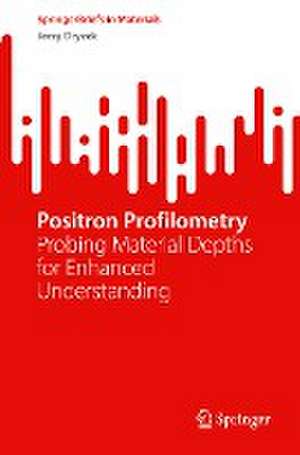Positron Profilometry: Probing Material Depths for Enhanced Understanding: SpringerBriefs in Materials
Autor Jerzy Dryzeken Limba Engleză Paperback – 9 sep 2023
Din seria SpringerBriefs in Materials
-
 Preț: 346.86 lei
Preț: 346.86 lei -
 Preț: 343.98 lei
Preț: 343.98 lei -
 Preț: 344.90 lei
Preț: 344.90 lei -
 Preț: 357.97 lei
Preț: 357.97 lei -
 Preț: 344.90 lei
Preț: 344.90 lei -
 Preț: 344.90 lei
Preț: 344.90 lei -
 Preț: 394.83 lei
Preț: 394.83 lei -
 Preț: 377.18 lei
Preț: 377.18 lei -
 Preț: 375.23 lei
Preț: 375.23 lei -
 Preț: 380.63 lei
Preț: 380.63 lei -
 Preț: 374.46 lei
Preț: 374.46 lei -
 Preț: 378.92 lei
Preț: 378.92 lei -
 Preț: 378.92 lei
Preț: 378.92 lei -
 Preț: 380.07 lei
Preț: 380.07 lei -
 Preț: 377.18 lei
Preț: 377.18 lei -
 Preț: 343.98 lei
Preț: 343.98 lei -
 Preț: 344.21 lei
Preț: 344.21 lei -
 Preț: 377.18 lei
Preț: 377.18 lei -
 Preț: 376.22 lei
Preț: 376.22 lei -
 Preț: 374.85 lei
Preț: 374.85 lei -
 Preț: 412.30 lei
Preț: 412.30 lei -
 Preț: 377.18 lei
Preț: 377.18 lei -
 Preț: 376.22 lei
Preț: 376.22 lei -
 Preț: 374.08 lei
Preț: 374.08 lei -
 Preț: 445.88 lei
Preț: 445.88 lei -
 Preț: 376.80 lei
Preț: 376.80 lei -
 Preț: 385.47 lei
Preț: 385.47 lei -
 Preț: 377.35 lei
Preț: 377.35 lei -
 Preț: 377.18 lei
Preț: 377.18 lei -
 Preț: 375.45 lei
Preț: 375.45 lei -
 Preț: 377.35 lei
Preț: 377.35 lei -
 Preț: 377.73 lei
Preț: 377.73 lei -
 Preț: 380.07 lei
Preț: 380.07 lei -
 Preț: 380.07 lei
Preț: 380.07 lei -
 Preț: 378.71 lei
Preț: 378.71 lei -
 Preț: 412.30 lei
Preț: 412.30 lei -
 Preț: 380.07 lei
Preț: 380.07 lei -
 Preț: 377.18 lei
Preț: 377.18 lei -
 Preț: 378.71 lei
Preț: 378.71 lei -
 Preț: 377.57 lei
Preț: 377.57 lei -
 Preț: 377.18 lei
Preț: 377.18 lei -
 Preț: 442.24 lei
Preț: 442.24 lei -
 Preț: 378.34 lei
Preț: 378.34 lei -
 Preț: 381.00 lei
Preț: 381.00 lei -
 Preț: 373.32 lei
Preț: 373.32 lei -
 Preț: 376.22 lei
Preț: 376.22 lei -
 Preț: 377.95 lei
Preț: 377.95 lei -
 Preț: 376.80 lei
Preț: 376.80 lei -
 Preț: 376.04 lei
Preț: 376.04 lei
Preț: 315.57 lei
Nou
Puncte Express: 473
Preț estimativ în valută:
60.39€ • 62.82$ • 49.86£
60.39€ • 62.82$ • 49.86£
Carte disponibilă
Livrare economică 25 martie-08 aprilie
Preluare comenzi: 021 569.72.76
Specificații
ISBN-13: 9783031410925
ISBN-10: 3031410920
Pagini: 143
Ilustrații: VI, 143 p. 90 illus., 36 illus. in color.
Dimensiuni: 155 x 235 mm
Greutate: 0.27 kg
Ediția:1st ed. 2023
Editura: Springer Nature Switzerland
Colecția Springer
Seria SpringerBriefs in Materials
Locul publicării:Cham, Switzerland
ISBN-10: 3031410920
Pagini: 143
Ilustrații: VI, 143 p. 90 illus., 36 illus. in color.
Dimensiuni: 155 x 235 mm
Greutate: 0.27 kg
Ediția:1st ed. 2023
Editura: Springer Nature Switzerland
Colecția Springer
Seria SpringerBriefs in Materials
Locul publicării:Cham, Switzerland
Cuprins
Introduction.- Positron Annihilation Techniques.- Fate of Energetic Positrons in Matter.- Positron Implantation Profile.- Positron in Inhomogeneous Matter.
Notă biografică
Jerzy Dryzek is a physicist and a researcher specializing in the field of positron annihilation. With over three decades of experience, he has made significant contributions to the study of electrical properties and conductivity of thin metallic films, as well as the measurement of positron lifetimes in various materials. Prof. Dryzek obtained his Ph.D. in solid-state physics from the Academy of Mining and Metallurgy, where he conducted research on electrical properties of thin metallic films. His doctoral thesis focused on the electrical conductivity of films made of gold, silver, and copper. Prior to his Ph.D., he completed his master's degree in nuclear physics at Jagiellonian University in Kraków, investigating the positron lifetimes in silver films. Throughout his career, Prof. Dryzek has held several notable positions. Since 1987, he has been associated with the Institute of Nuclear Physics PAN in Kraków, where he has dedicated his efforts to the development of the positron annihilation laboratory. Additionally, he served as a lecturer of physics at the Pedagogical University in Kraków from 1990 to 1992 and for several years from 2005 to 2014 at the University of Zielona Góra and the University of Opole in Poland. Prof. Dryzek also engaged in research work abroad, including visits to the Laboratory of Physics at Helsinki University of Technology in Finland, Münster University in Germany, and Texas Christian University in the USA. Prof. Dryzek's expertise in positron spectroscopy and annihilation characteristics in condensed matter led to his habilitation thesis titled "Positron annihilation characteristics in condensed matter," which earned him the title of Assistant Professor in the Institute of Nuclear Physics PAN. He further expanded his research by working on the construction of a pulsing positron beam at Chalmers University of Technology in Sweden and studying polymer materials using a pulsing positron beam at KEK in Tsukuba, Japan
Caracteristici
Features comprehensive coverage of positron profilometry, unraveling defect depth distribution in various materials Gives an in-depth analysis of positron annihilation techniques and different implantation profiles Reflects extensive research spanning two decades from an accomplished author in this field
